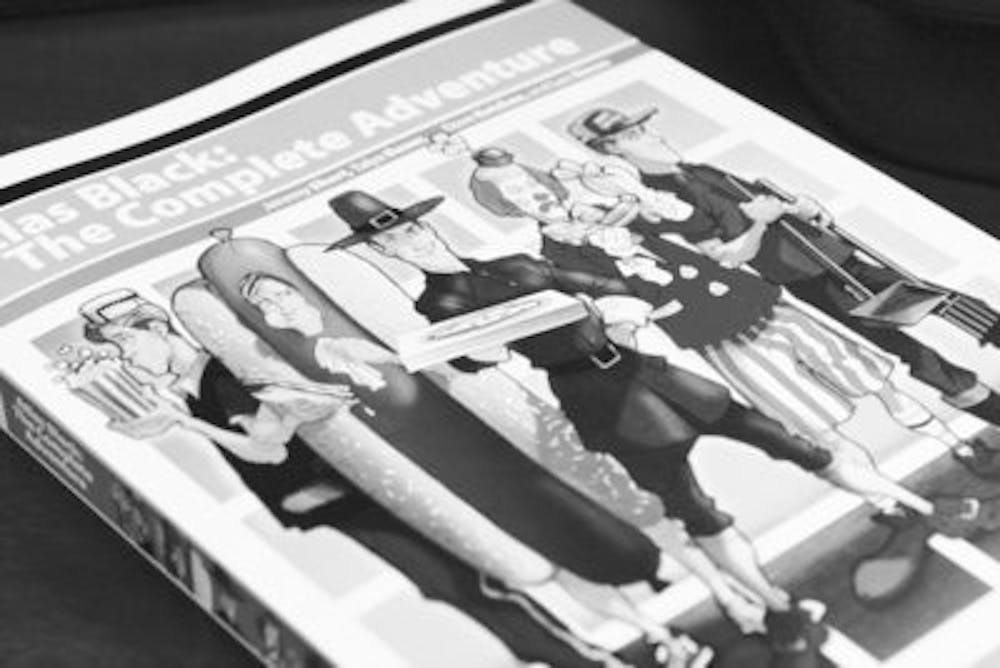Comic books aren't just for kids anymore.
Dave Ketchen, eminent scholar and professor of management, is in the process of co-authoring his fourth graphic novel textbook, expected to be released next summer.
His previous three books covered business topics including management, franchising and family business.
The difference between these and regular textbooks is that they are written in comic book format, with art, characters and storylines that illustrate business concepts.
"There's a lot of really cool stuff that goes on now that didn't go on, let's say, 20 years ago," Ketchen said. "But textbooks have stayed the same. They're just as boring today as they were 20 years ago. So we kind of asked ourselves, 'Is there a way to come up with a textbook that would be more interesting that students would actually look forward to reading?'"
A number of different people have been a part of the graphic novel's production, including several artists and coauthors. However, Ketchen's consistent collaborator on all of the books has been Jeremy Short, associate professor of management at the University of Oklahoma.
Short and Ketchen were responsible for all the creative points in the graphic novels, including characters and storylines.
Short met Ketchen in the late 1990s at Louisiana State University, before Ketchen came to Auburn. Short was Ketchen's doctoral student at the time.
The two began work on the graphic novels in 2009.
Short said he wanted to partner with Ketchen because of Ketchen's prestigious reputation and large contribution to the College of Business' collection of research articles.
"So one of the things that we wanted to do with these books, and one of the huge reasons why I wanted to get Dave involved early--besides he's just a great and really fast writer--is he's just a well-known researcher," Short said. "It adds to the legitimacy that's important for these kinds of books."
The first graphic novel the two wrote was titled "Atlas Black: Managing to Succeed" and was published in 2010.
The book has a sequel called "Atlas Black: Management Guru."
Both Atlas Black books were co-authored by Talya Bauer, professor of business administration at Portland State University and were illustrated by artist Len Simon.
The third book is called "Tales of Garcon: The Franchise Players." It explores the dynamics of a family business.
Although Ketchen and Short continued to work together, this book was coauthored by Jim Combs, professor of management at Florida State University, and illustrated by artist Will Terrell.
Short said despite how unusual they are as textbooks, the graphic novels have had a high success rate among students.
"Eighty-five percent of students like it more than traditional textbooks or traditional case materials we've had," Short said. "We've received several comments from students just saying that they love it."
Neil Danville, senior in entrepreneurship and family business, took two courses with Ketchen in which the graphic novels were assigned as textbooks.
"I thought they helped a lot because in the beginning when you get a book, any student's not going to want to read it and they dread reading it," Danville said. "I just thought it was a way of disguising the material that would be in a traditional book, but once I got to reading it, you get caught up in the material as well as the story that's going on in the comic book, so it really is engaging and I really did get a lot from it."
Short said he has used the books in the classroom both exclusively and as supplements. He said the books can be used both inside and outside the classroom.
"Part of our inspiration, too, would be the idea that these books could be used by just anybody who is interested in business," Short said. "So you wouldn't necessarily have to be a business student at all."
Ketchen said he thinks the real strength of the graphic novels is that they contain elements that traditional textbooks lack.
"I think they add a third dimension to the concepts," Ketchen said. "I think if you use a traditional textbook, you're sort of living in a two-dimensional world. But this can really bring the concepts to life."
Do you like this story? The Plainsman doesn't accept money from tuition or student fees, and we don't charge a subscription fee. But you can donate to support The Plainsman.





